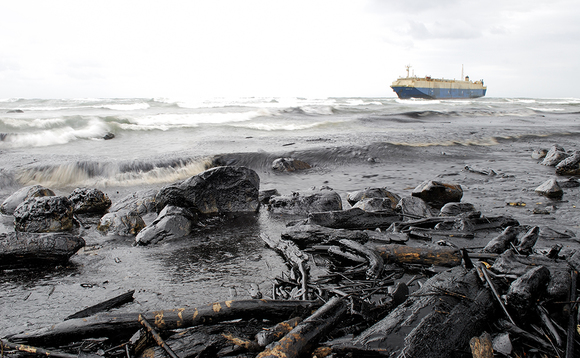
The sinking of Altor’s OW Bunker

The collapse of Altor-owned shipping fuel business OW Bunker has been labelled one of the biggest scandals in Danish financial history. What exactly went wrong and who is responsible remains unclear. Mikkel Stern-Peltz reports
"Nobody would be happier than us, being able to say what has really happened, but we don't know. We truly don't know," says Altor's Tor Krusell of the collapse of OW Bunker. "Our entire focus right now is how quickly we can get some sort of investigation completed so that we can see what exactly did happen."
On November 7, shipping fuel trader OW Bunker – the second-largest company in Denmark measured by revenue – filed for bankruptcy.
The company, which had floated on the Copenhagen stock exchange just seven months earlier, was broadsided without warning by two sudden and huge losses from a failed oil hedging strategy and what was first thought to be fraud, with a total of nearly $300m evaporating and leaving the company insolvent.
Credit check
In conjunction with a $150m loss related to risk management, Dynamic Oil Trading, a Singaporean subsidiary, had amassed a $125m loss – originally said by management to have been the result of fraud – on a credit line it had extended to a client who was unable to pay.
It was revealed that any credit line of this size had to be approved by the board, of which Altor partner Søren Johansen is a member, though the board of directors denies having seen or approved the credit.
While speculations of who is to blame run riot, liquidators and legal teams are sifting through the wreckage at OW Bunker's Aalborg headquarters to find out the cause of the sudden sinking and see what can be salvaged.
Altor – which acquired OW Bunker in 2007, oversaw its IPO and held a 35% stake when the company went under – has not escaped scrutiny. But while the GP stands to loose DKK 1bn because of the bankruptcy, it reportedly earned DKK 3.5bn in the listing.
Altor's aftermath
Questions have been raised about the due diligence undertaken ahead of OW Bunker's flotation by the GP and the three banks selected for the IPO: Altor-owned Carnegie, Morgan Stanley and Nordea. Criticism has especially centred on the prospectus referring to the company as "conservative" and praising the risk management that has since failed so spectacularly.
When asked if due diligence had been thorough enough, Krusell replies: "Of course. It's evident that we were trying to do it in the most professional way. The overriding theme right now is so many people being affected in different ways. It's a very unfortunate blame game where people are pointing fingers in many different directions, and that's what we're going to be in until we have a third party investigation done so we can conclude what really happened."
Altor has worked to improve its public perception in recent years, as private equity has come under increasing public and political scrutiny in Sweden, and until the bankruptcy proceedings and investigations yield their conclusions, the full extent of how the GP will be affected is unclear. However, it is unlikely to escape with its reputation unscathed.
Three Altor investments have been written off since 2011, with Relacom taken over by its lenders that year and Nimbus Boats going bankrupt in 2012.
Several experts and commentators in the Danish and Swedish financial press point out how this, in conjunction with OW Bunker, means new IPOs will be almost impossible for Altor in the near future and the GP may find it harder to do business in the Nordic region.
Tarred with the same brush
Jan Almgren, a reporter at Swedish publication Svenska Dagbladet, highlighted the decision to sell Apotek Hjärtat to ICA rather than float it as an example. He said the bankruptcy is likely to adversely affect any private equity-backed IPOs in Sweden for some time.
Krusell agrees that there will definitely be an impact in Denmark, but says: "If we have a very, very good company, I think we still have a great possibility to do an IPO. I understand that there might be questions and concerns, but we will definitely be able to put companies on the stock exchange."
Adding to Altor's troubles, investors are banding together in an attempt to seek compensation through legal action. Though who the lawsuit would be aimed at is yet to be determined, if Carnegie is targeted – as some have suggested – it could prove a double-whammy for Altor as its Fund III owns the bank.
Among the institutional investors who took substantial losses are a number of Danish pension funds, including ATP, PFA and PensionDanmark, whose losses are estimated to run into the hundreds of millions of DKK.
PensionDanmark is an LP in Altor Funds II, III, and IV, and though the GP is not currently fundraising, questions may be raised about what happens when it goes on the road again.
Krusell says the fund's LPs have not raised any concerns yet, and that while a failure of this kind hurts, he has not yet seen an effect on Altor's ability to do business.
He says a case like this is "never good", calling it a "tragedy" and "failure", but points to the GP's track record: "Fortunately, on the other hand we have had many, many successful companies that we have developed and sold.
"What that has created is that we have consistently been able to have great performance in the funds we have had and we feel we have a very good support from our investors."
Latest News
Stonehage Fleming raises USD 130m for largest fund to date, eyes 2024 programme
Multi-family office has seen strong appetite, with investor base growing since 2016 to more than 90 family offices, Meiping Yap told Unquote
Permira to take Ergomed private for GBP 703m
Sponsor deploys Permira VIII to ride new wave of take-privates; Blackstone commits GBP 200m in financing for UK-based CRO
Partners Group to release IMs for Civica sale in mid-September
Sponsor acquired the public software group in July 2017 via the same-year vintage Partners Group Global Value 2017
Change of mind: Sponsors take to de-listing their own assets
EQT and Cinven seen as bellweather for funds to reassess options for listed assets trading underwater








